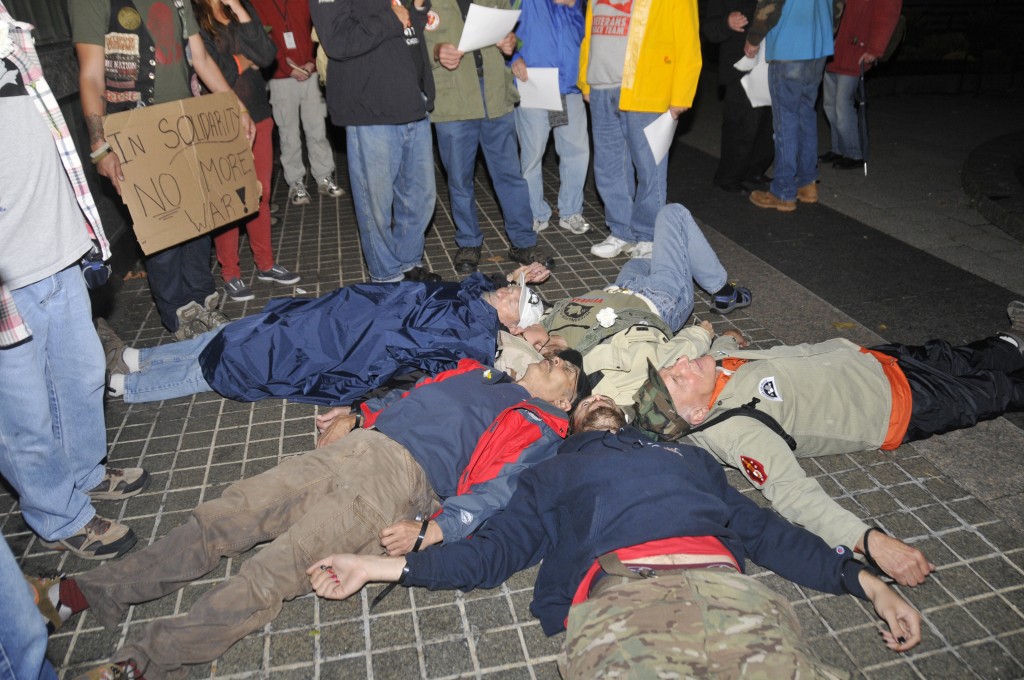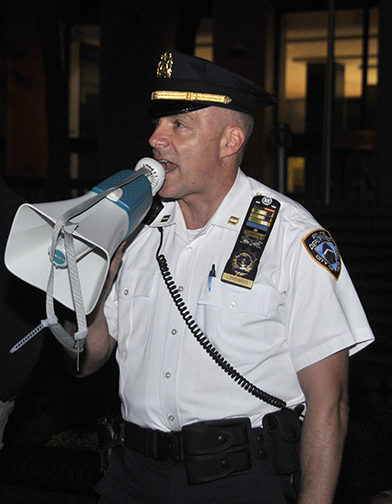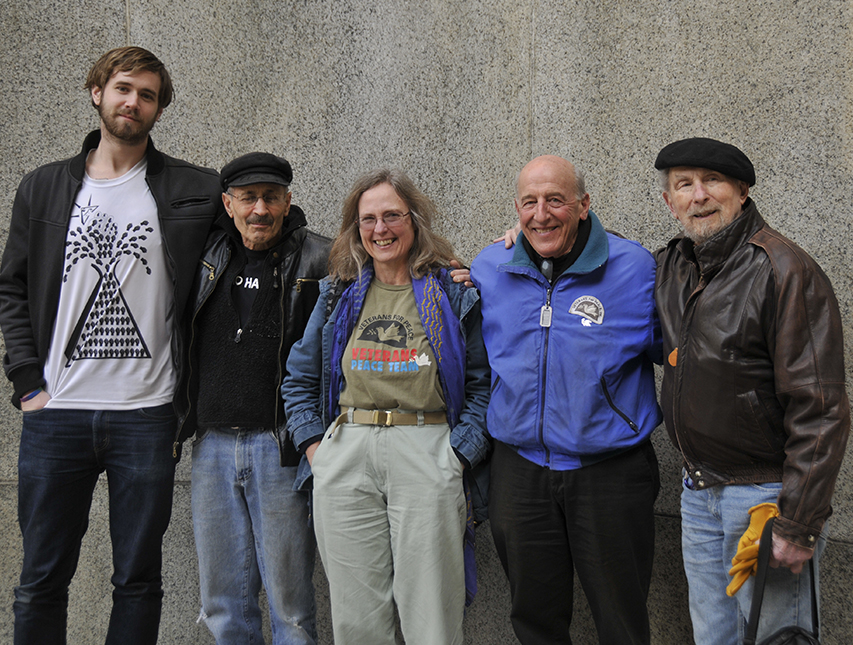
Click for information about Full Disclosure: An Honest Commemoration of the American War in Viet Nam April 26
By Ellen Davidson
Five U.S. military veterans went on trial today on charges stemming from a protest at the Vietnam Veterans Plaza in New York City last fall.

Five veterans cuffed themselves together to symbolize how death permanently links those killed in Vietnam, Iraq, and Afghanistan. Photo by ELLEN DAVIDSON
The five were among 19 arrested Oct. 7, 2013, as they read the names of the war dead from Vietnam, Iraq, and Afghanistan, as well as from the numerous U.S. drone wars around the world, and placed flowers in vases. They were arrested for being in the park after the posted 10 pm closing time, which is only enforced when there are protests in the park. Usually, the park, which is an open plaza, is used at all hours by dog walkers, workers in the adjoining office buildings, tourists, and others, but on three occasions when there have been political gatherings on the plaza, police have arrested participants for staying past the closing time. The first was May 1, 2012, when members of the Occupy movement held a general assembly there after a May Day march. The second was Oct. 7, 2012, when veterans and their allies marked the 11th anniversary of the beginning of the U.S. war and occupation in Afghanistan. The 2012 charges were dismissed “in the interests of justice” last July by Judge Robert Mandelbaum, who first convicted 12 defendants after a weeklong trial in which they argued that the city must show an overriding interest in closing the park that overrides their First Amendment rights to free speech in a public venue.
In the October 2013 action, organized by Veterans For Peace, 14 participants were issued summonses charging them with “remaining in the park after it is closed to public” and “failure to comply with a police order.” Their charges were dismissed Dec. 19. The remaining five arrestees had handcuffed themselves together to symbolize the fact that those killed in wars are permanently linked by death. This earned them six charges: resisting arrest, obstructing government administration, disorderly conduct, failure to obey a park sign, trespassing, and failure to obey a lawful order. On March 6, the assistant district attorney dismissed the first two charges, which carried possible jail sentences of up to a year and would have guaranteed the defendants the right to a jury trial. They are now being tried before Judge Kevin McGrath on the remaining four charges.
“What we are disputing,” said National Lawyers Guild attorney Jonathan Wallace in his opening statement to a courtroom filled with supporters, “is a more fundamental constitutional issue, which is whether the city has the ability to declare this space closed.” He was referring to the fact that Vietnam Veterans Plaza is an open thoroughfare with no barriers to entry. He argued that the memorial is in fact designed to invite entry at all hours. “The majority of memorials are open 24 hours in order to promote meditation, serenity, and remembrance,” he noted. Two small signs at either end are the only indication that it is closed after 10 pm, and it is possible to cross through the park area without passing either of these signs. The only reason for declaring the park closed, he said, “is for the purpose of keeping First Amendment speech out.”
In her opening statement NLG lawyer Patricia Wright said this case is “about honoring the dead, about the right to First Amendment protected speech.”
The third NLG attorney in the case, Martin S. Stolar, noted that the borders of the park aren’t even clearly delineated. Half the plaza is New York City park property and half is privately held by the owners of the adjacent building at 55 Water Street. “If you cross an imaginary line,” he said, “you don’t have the First Amendment.”
The prosecution called several witnesses in the first day of the trial. The first was Sgt. Kendal Creer of the Manhattan South Task Force, the arresting officer. He testified that he and about 10 other officers were assigned to go to the Vietnam Veterans Plaza at the beginning of their shift, arriving there at about 7:10 pm. He said that they remained in their police vans outside the park until they “moved into position” at about 9:30 pm.

Sixth Precinct Captain Andrew Lombardo warned protesters to leave the park or face arrest Oct. 7. Photo by ELLEN DAVIDSON
There was also testimony from Sixth Precinct Capt. Andrew Lombardo, who claimed that the demonstrators went to the park intending to get arrested. He said that he had learned this through talking with the protesters, but when pressed, could not recall any specific conversation with any of the defendants. The veterans contend that they intended to exercise their First Amendment rights and the decision to arrest them or not lay with the police.
The final witness of the day was Ralph Musolino of the New York City Department of Parks and Recreation. He testified that he had been involved in the decision to deny Veterans For Peace a permit for this event. In 2012, the group had received a permit to have a sound system for a rally, which ended at 9 pm and was followed by reading the names of the dead. In 2013, since they were denied a permit, they did not use any sound system. Attorney Stolar, in his cross-examination, pointed out that the group had not violated the terms of the 2012 permit, since the arrests, which resulted in dismissed charges, took place after the event covered by the permit.

Left to right: defendants Micah Turner, Tarak Kauff, Ellen Barfield, Ken Mayers, and Jay Wenk. Photo by ELLEN DAVIDSON
The defendants are Ellen Barfield, an Army sergeant who served 1977-1981 as an engineer equipment mechanic; Tarak Kauff, an Army paratrooper from 1959 to 1962 and a member of the Veterans For Peace national board; Ken Mayers, a retired major in the Marine Corps; Micah Turner, a three-tour Afghanistan and one-tour Iraq vet; and Jay Wenk, a decorated World War II infantryman who helped liberate the Dachau and Buchenwald concentration camps.
“We’re disappointed to be on trial at all without a jury,” said Barfield, “and the minutiae was deadly, but the excellent brief our attorneys submitted states so clearly what it’s all about, our First Amendment rights, everybody’s First Amendment rights.”
“Of all the amendments, the right to assemble is the first one, it’s the First Amendment, and there’s a good reason for that,” said defendant Kauff, “If we don’t have the right to assemble, we have nothing, and we are nothing. That’s why we are standing up for the right to assemble. That’s why we did this.”
